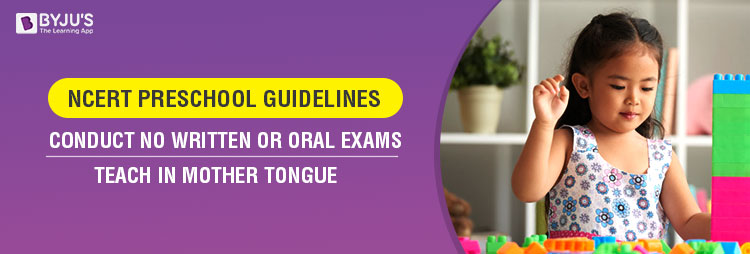
The National Council of Educational Research and Training, NCERT, expressed concern over the educational practice that the pre-schools follow these days. The first-ever pre-school curriculum of NCERT added that children of age 3 to 6 should be taught in their mother tongue. They also objected to the practice of subjecting the students to tests of any kind, terming it a harmful and undesirable practice that results from a misguided parental aspiration.
Pre-school children to learn in the mother tongue
Early education plays a vital role in the life of a child, growing up. Hence, learning in their home language can help students in learning faster. It is internationally recognised that teaching through a child’s mother tongue is the most appropriate medium of instruction at a young age. Acknowledging the challenge of linguistic diversity in India, the NCERT guidelines added that if the students in a classroom have no common mother tongue, then teachers may use as many languages as in the classroom as a medium of instruction, while gradually exposing them to school language. NCERT also added that the children need a multilingual environment for smooth transition along with exposure to sign language as well.
No more written or oral test in pre-school
The curriculum developing body HRD Ministry, NCERT, said that under no circumstance should the pre-school students be made to take any form of examination, either written or oral. A senior NCERT official also emphasized that the purpose of evaluation at the pre-school level is not to label a child as ‘pass’ or ‘fail’.
The teachers are asked closely to observe the children- how and where children spend time, their social relationships, use of language, modes of interaction, information about health and nutrition habits, and to make a brief note of these observations. An official of NCERT added that the progress of the child has to be assessed continuously by various methods and techniques that include anecdotal records, checklists, portfolios, and interactions with other children. These evaluations should be available in folders for the parents to view and should be with the pre-school as long as the child moves to another pre-school program or to a primary school. The NCERT also mentioned that a written and verbal progress summary report of the child should be given to their parents at least twice a year.
As a part of “guidelines for pre-school education”, the NCERT has enlisted the dos and don’ts about how assessment should be carried out and reported in pre-schools.
Different parameters for infrastructure, qualifications, and salary for pre-school staff, admission process, records and registers to be maintained, monitoring and supervision mechanism, the importance of coordination and convergence with community and parents, etc. have also been defined in the guidelines provided by NCERT for pre-school education.
Students can find different study materials including NCERT Solutions, NCERT Books, Sample Papers, syllabus, etc. at BYJU’S. Visit BYJU’S to avail of these study materials.